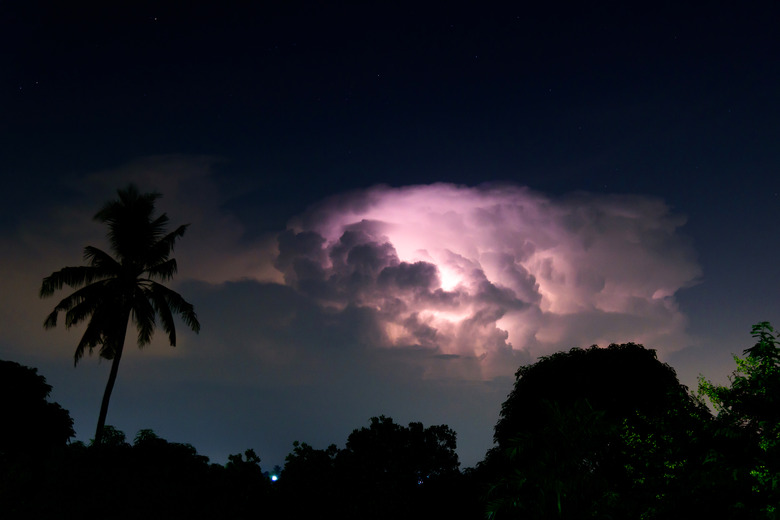How To Stay Safe During A Lightning Storm
Lightning can strike on the most beautiful of days. It can be brought on by heat, an oncoming thunderstorm or remnants of a storm that fell apart. The only real predictor of lightning is hearing thunder. When you see a lightning storm, take shelter immediately, if possible.
Step 1
Seek shelter when you hear thunder, lightning can strike up to 10 miles from the heart of a thunderstorm. Take cover, preferably in a brick-and-mortar building such as a house, and stay away from all windows and doors. Metal attracts lightning and conducts electricity, so stay away from metal sheds and outbuildings.
Step 2
Remove any metal objects on your possession, if there are no buildings available for shelter. Sports teams that are often caught in thunder-and-lightning storms remove all shoes or equipment with metal cleats or handles. Stay away from metal bleachers and fences.
Step 3
Stay away from trees. Though a tall tree may seem like a sturdy structure to take shelter under during a lightning storm, it is one of the worst places to hide.
Step 4
Get away from water. On or in water is the absolute worst place to be during a lightning storm. Water is a conductor of electricity, so there is no safe place on a lake or pond to hide.
Step 5
Stay off of corded telephones, computers and any other electrical equipment in the home.
Step 6
Stay away from all plumbing outlets in the shelter. Lightning can follow the path of water.
Step 7
Use surge protectors for all electrical equipment to reduce the chance of fires starting due to lightning strikes.
Step 8
Install ground fault protectors on all outlets near plumbing fixtures. This should be done in all homes.
TL;DR (Too Long; Didn't Read)
If a person is struck by lightning, call 911 immediately. Give any medical attention necessary. The person struck does not pose any danger of carrying an electric charge unless they are actively being shocked or are still touching live power lines.
Warning
According to the National Weather Service, in 2007, of the 45 people struck and killed by lightning, 25 percent had taken shelter under trees, and 25 percent were on water when struck.
Cite This Article
MLA
Cam, Christine. "How To Stay Safe During A Lightning Storm" sciencing.com, https://www.sciencing.com/stay-safe-during-lightning-storm-2313448/. 22 November 2019.
APA
Cam, Christine. (2019, November 22). How To Stay Safe During A Lightning Storm. sciencing.com. Retrieved from https://www.sciencing.com/stay-safe-during-lightning-storm-2313448/
Chicago
Cam, Christine. How To Stay Safe During A Lightning Storm last modified March 24, 2022. https://www.sciencing.com/stay-safe-during-lightning-storm-2313448/
